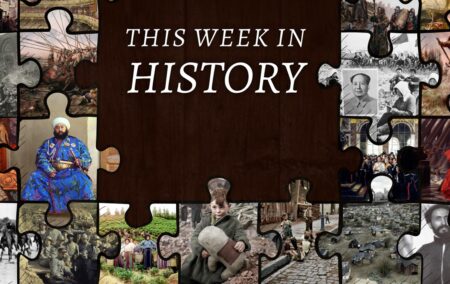This Week in History is a new weekly feature recalling memorable and decisive events and personalities of the past.
May 7th 1945 – Germany surrenders, ending Second World War in Europe
After Adolf Hitler’s suicide on 30 April 1945, the surrender of all German armed forces was signed by German General Alfred Jodl before American general, and future United States president, Dwight Eisenhower. Jodl attempted to limit the surrender to the Western Allies, hoping to continue the fight against the Soviet armies. When Eisenhower rejected this, Jodl agreed to the total unconditional surrender of the German armed forces. This finally brought an end to almost all fighting in Europe, leaving Japan as the only major power fighting the United Nations.
Jodl would go on to be convicted for war crimes at the Nuremberg Trial a year later, and executed.
While almost all of us today have a vague knowledge of the Second World War, we often forget its staggering cost in human lives, economic damage and emotional trauma. This excellent video is a powerful visualisation of just how enormous was the loss of human life https://www.youtube.com/watch?v=DwKPFT-RioU
May 6th 1994 – Channel Tunnel opens between the UK and France
The Channel Tunnel, at 50 kms, was the longest undersea tunnel in the world. It made it possible to cross by land between England and France for the first time since the end of the Ice Age thousands of years ago. Plans to build an undersea link between France and the UK had been proposed as early as 1802, but it wasn’t until 1988 that construction on such a project began.
Calculated at the time to be the most expensive construction project in the modern period, it would turn out to cost nearly double its projected budget of 5bn British Pounds.
Today the tunnel makes it possible to drive from London to Paris in just two and a half hours.
A news report of the opening https://www.youtube.com/watch?v=O70FRKl5IwM
May 4th 1979 – Margaret Thatcher sworn in as Britain’s first female Prime Minister
Margaret Thatcher, who would come to be known as the ‘Iron Lady’ for her reputation of toughness and political willpower, dominated British politics for over ten years. She would live up to her reputation by significantly reducing the power of trade unions in the United Kingdom, and despatching an expeditionary force to take back the Falkland Islands after an Argentine invasion. She continues to define a significant wing of the British Conservative Party, and her legacy as a free market reformer still inspires many liberals and free market conservatives across the world.
Thatcher’s interview with the media just after winning the election https://www.youtube.com/watch?v=MZPqBNc4wmw
May 3rd 1469 – Niccolo Machiavelli is born
Born in Florence around the beginning of the Early Modern period of European history, Machiavelli would become one of history’s most influential political writers, with the publication of his treatise, The Prince. Machiavelli’s book of political advice, written for one of his wealthy political patrons, emphasised cold-eyed pragmatism and brutality in the navigation of politics.
Italy at the time was divided between numerous highly competitive city states presided over by powerful nobles whose rivalry created conditions for innovation, art and commerce, but also warfare and vicious politics. It was in this atmosphere of contest, murder, war and intrigue that The Prince was written.
Today, his name is synonymous with cunning and devious dealing, amply reflected in his advice that ‘It is better to be feared than loved’.
An audio-only reading of the The Prince in English https://www.youtube.com/watch?v=IdRxHTih-28
May 2nd 1885 – Congo Free State established by King Leopold II of Belgium
A personal project of King Leopold II of Belgium, the Congo Free State – as it was called – is generally regarded as one of the worst examples of colonialism in the 19th century. Under the guise of fighting the slave trade and advancing humanitarian efforts, King Leopold managed to get the Congo under his personal control at the Berlin Conference in 1885. What followed was the brutal exploitation of the local population to acquire rubber, in a period that became notorious for mutilations and cruelty. Eventually these atrocities would come to light and, after powerful international lobbying against Leopold, the Congo was annexed by Belgium in 1908.
A video exploring the history of the brutality of the Congo Free State https://www.youtube.com/watch?v=FhPZZqp9cp8
If you like what you have just read, subscribe to the Daily Friend

